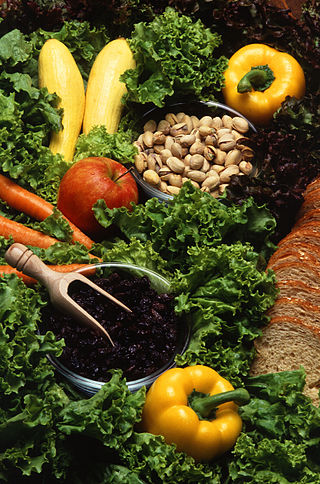Nutrition may refer to:
- Nutrition, the process by which an organism uses food to sustain life:
- Nutritional science or nutrition science
- Nutrition (journal), a medical journal
- "Nutrition", a song by Hieroglyphics from the album The Kitchen
Nutrition may refer to:

A bean is the seed of several plants in the family Fabaceae, which are used as vegetables for human or animal food. They can be cooked in many different ways, including boiling, frying, and baking, and are used in many traditional dishes throughout the world.

A prune is a dried plum, most commonly from the European plum tree. Not all plum species or varieties can be dried into prunes. A prune is the firm-fleshed fruit (plum) of Prunus domestica varieties that have a high soluble solids content, and do not ferment during drying. Use of the term "prune" for fresh plums is obsolete except when applied to varieties of plum grown for drying.

Umami, or savoriness, is one of the five basic tastes. It has been described as savory and is characteristic of broths and cooked meats.

Dietary fiber or roughage is the portion of plant-derived food that cannot be completely broken down by human digestive enzymes. Dietary fibers are diverse in chemical composition, and can be grouped generally by their solubility, viscosity, and fermentability, which affect how fibers are processed in the body. Dietary fiber has two main components: soluble fiber and insoluble fiber, which are components of plant-based foods, such as legumes, whole grains and cereals, vegetables, fruits, and nuts or seeds. A diet high in regular fiber consumption is generally associated with supporting health and lowering the risk of several diseases. Dietary fiber consists of non-starch polysaccharides and other plant components such as cellulose, resistant starch, resistant dextrins, inulin, lignins, chitins, pectins, beta-glucans, and oligosaccharides.

Dog food is specifically formulated and intended for consumption by dogs and other related canines. Dogs are considered to be omnivores with a carnivorous bias. They have the sharp, pointed teeth and shorter gastrointestinal tracts of carnivores, better suited for the consumption of meat than of vegetable substances, yet also have ten genes that are responsible for starch and glucose digestion, as well as the ability to produce amylase, an enzyme that functions to break down carbohydrates into simple sugars – something that obligate carnivores like cats lack. Dogs evolved the ability living alongside humans in agricultural societies, as they managed on scrap leftovers and excrement from humans.
B vitamins are a class of water-soluble vitamins that play important roles in cell metabolism and synthesis of red blood cells. They are a chemically diverse class of compounds; some contain sulfur and B12 contains cobalt. Dietary supplements containing all eight are referred to as a vitamin B complex. Individual B vitamins are referred to by B-number or by chemical name, such as B1 for thiamine, B2 for riboflavin, and B3 for niacin, while some are more commonly recognized by name than by number, such as pantothenic acid (B5), biotin (B7), and folate (B9).

A chocoholic is a person who craves or compulsively consumes chocolate. The word "chocoholic" was first used in 1968, according to Merriam-Webster. It is a portmanteau of "chocolate" and "alcoholic". The term is used loosely or humorously to describe a person who is inordinately fond of chocolate; however, there is medical evidence to support the existence of actual addiction to chocolate. Psychoactive constituents of chocolate that trigger a ‘feel-good’ reaction for the consumer include tryptophan and phenylethylamine, which may contribute to cravings and addiction-like responses, particularly in people with specific genetic alleles. The quantity of sugars used in chocolate confections also impacts the psychoactive effects of chocolate.

A plant-based diet is a diet consisting mostly or entirely of plant-based foods. Plant-based diets encompass a wide range of dietary patterns that contain low amounts of animal products and high amounts of fiber-rich plant products such as vegetables, fruits, whole grains, legumes, nuts and seeds. They do not need to be vegan or vegetarian, but are defined in terms of low frequency of animal food consumption.

Vegetarian nutrition is the set of health-related challenges and advantages of vegetarian diets.

The President's Council on Sports, Fitness and Nutrition (PCSFN) is an American government organization that aims to promote "programs and initiatives that motivate people of all ages, backgrounds, and abilities to lead active, healthy lives." It is part of the Office of Public Health and Science, an agency of the United States Department of Health and Human Services. Prior to June 2010, it was called the President's Council on Physical Fitness and Sports.
The United States National Agricultural Library (NAL) is one of the world's largest agricultural research libraries, and serves as a national library of the United States and as the library of the United States Department of Agriculture. Located in Beltsville, Maryland, it is one of five national libraries of the United States. It is also the coordinator for the Agriculture Network Information Center (AgNIC), a national network of state land-grant institutions and coordinator for the U.S. Department of Agriculture (USDA) field libraries.

Vulimiri Ramalingaswami was an Indian medical scientist, pathologist and medical writer. His pioneering research on nutrition got him elected to the National Academy of Sciences, Russian Academy of Medical Sciences and the Royal Society of London.

Nutritional yeast is a deactivated yeast, often a strain of Saccharomyces cerevisiae, that is sold commercially as a food product. It is sold in the form of yellow flakes, granules, or powder and can be found in the bulk aisle of most natural food stores. It is popular with vegans and vegetarians and may be used as an ingredient in recipes or as a condiment.

In gastronomy, red meat is commonly red when raw, in contrast to white meat, which is pale in color before cooking. In culinary terms, only flesh from mammals or fowl is classified as red or white. In nutritional science, red meat is defined as any meat that has more of the protein myoglobin than white meat. White meat is defined as non-dark meat from fish or chicken.
Nutritional genomics, also known as nutrigenomics, is a science studying the relationship between human genome, human nutrition and health. People in the field work toward developing an understanding of how the whole body responds to a food via systems biology, as well as single gene/single food compound relationships. Nutritional genomics or Nutrigenomics is the relation between food and inherited genes, it was first expressed in 2001.

Timothy David Noakes is a South African scientist, and an emeritus professor in the Division of Exercise Science and Sports Medicine at the University of Cape Town.
Nutritional science is the science that studies the physiological process of nutrition, interpreting the nutrients and other substances in food in relation to maintenance, growth, reproduction, health and disease of an organism.

The American Society for Nutrition (ASN) is an American society for professional researchers and practitioners in the field of nutrition. ASN publishes four journals in the field of nutrition. It has been criticized for its financial ties to the food and beverage industry.
Allied Academies is a reportedly fraudulent corporation chartered under the laws of North Carolina. Its postal address is in London, United Kingdom. It presents itself as an association of scholars, with supporting and encouraging research and the sharing and exchange of knowledge as its stated aims. The organization consists of 30 affiliate academies, which provide awards to academics and publish academic journals both online and in hard copy for members. Since 2015 the organization has been listed on Jeffrey Beall's list of "potential, possible, or probable predatory scholarly open-access publishers". It is in a partnership with OMICS Publishing Group which uses its website and logo. In 2018, OMICS owner Srinubabu Gedela declared that he had informed the Nevada court that Allied Academies was a subsidiary of OMICS International. During a conference in 2018, they falsely listed a prominent chemist among its organizing committee who had not agreed to this and was not affiliated with Allied Academies.